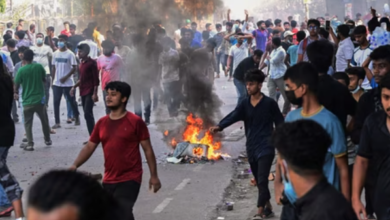
New Delhi Bollywood actress Swara Bhasker has called for the repeal of two controversial laws – Armed Forces Special Powers Act (AFSPA) and Unlawful Activities (Prevention) Act (UAPA).
While taking to micro-blogging platform Twitter, the actress wrote “Repeal AFSPA, Repeal UAPA”.
Swara Bhasker made the tweet in the backdrop of civilian killings in Nagaland by security forces in a reportedly mistaken ‘ambush’.
At least 13 civilians were gunned down by security forces in Mon district of Nagaland as the Indian Army confirmed the incident while terming it as an unfortunate one.
The incident took place between Oting and Tiru villages when some daily-wage labourers were returning home in a pick-up van from a coal mine in the evening on December 4, the police said.
The vehicle was allegedly fired upon by the Army personnel, who were conducting an operation in the area after receiving inputs on the movement of militants of Yung Aung faction of proscribed outfit NSCN (K), an official said, adding that an investigation is underway to ascertain whether the incident was a case of mistaken identity.

Soldiers from the Assam Rifles, an Indian army unit, opened fire on a truck carrying 30 or more coalmine labourers near their camp.
“The troopers had intelligence inputs about some militant movement in the area and on seeing the truck they mistook the miners to be rebels and opened fire killing six labourers,” a senior police official told Reuters.
As news spread of the killings, hundreds of locals surrounded the camp before burning vehicles belonging to the Assam Rifles and clashing with troopers.
Soldiers then shot dead a further seven people.
The Indian army said in a statement that one of its soldiers was killed in the clash, while others were injured.
It is imperative to state that the AFSPA is an act of the Indian Parliament that gives the Indian Armed Forces special powers to enforce public order in “disturbed” regions. The Disturbed Areas (Special Courts) Act of 1976 states that once an area is classified “disturbed”, it must maintain the status quo for a minimum of three months.
On September 11, 1958, a law was passed that applied to the Naga Hills, which were then part of Assam. It then spread to the other Seven Sister States in India’s northeast, one by one. It is currently in force in the states of Assam, Nagaland, Manipur (excluding the Imphal Municipal Council Area), Changlang, Longding, and Tirap districts of Arunachal Pradesh, and areas falling within the jurisdiction of the eight police stations of districts in Arunachal Pradesh bordering the state of Assam.
Another such act, enacted in 1983 and applied to Punjab and Chandigarh, was repealed in 1997, about 14 years after it was imposed.
Jammu and Kashmir has been governed under the law passed in 1990 that has been in effect since then.
Several sections have criticised the acts, claiming that they have resulted in human rights violations in the areas where they are supposed to be enforced. National politicians like as P. Chidambaram and Saifuddin Soz of the Congress have called for the repeal of AFSPA, while others such as Amarinder Singh have opposed its revocation.
On the other hand, the Unlawful Activities (Prevention) Act aims to prohibit illegal activities in India. Its principal goal was to provide authorities the power to deal with acts that threatened India’s integrity and sovereignty. (KNT)











